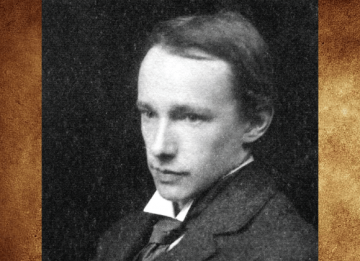Ray Monk in Prospect:
 “I almost worship him as if he were a god. I have never felt such an extravagant admiration for anybody.” So the 22-year-old Bertrand Russell wrote to his fiancée Alys Pearsall Smith in November 1894. The object of his “extravagant admiration” was George Edward Moore (always known as “GE Moore” because he hated both his given names), who was 18 months younger than Russell and at that time just an undergraduate. Russell was reporting to Alys on a meeting of the Apostles, the self-selecting and self-consciously elite discussion group (founded in 1820, and still in existence today) which only the students and fellows considered to be the brightest and best were invited to join. At their meetings, a member presented a case in a short paper—usually on a philosophical, cultural or political subject, designed to display both erudition and wit—which was then put to the vote. Russell had been enlisted in his second year at Cambridge, and Moore, likewise, two years later.
“I almost worship him as if he were a god. I have never felt such an extravagant admiration for anybody.” So the 22-year-old Bertrand Russell wrote to his fiancée Alys Pearsall Smith in November 1894. The object of his “extravagant admiration” was George Edward Moore (always known as “GE Moore” because he hated both his given names), who was 18 months younger than Russell and at that time just an undergraduate. Russell was reporting to Alys on a meeting of the Apostles, the self-selecting and self-consciously elite discussion group (founded in 1820, and still in existence today) which only the students and fellows considered to be the brightest and best were invited to join. At their meetings, a member presented a case in a short paper—usually on a philosophical, cultural or political subject, designed to display both erudition and wit—which was then put to the vote. Russell had been enlisted in his second year at Cambridge, and Moore, likewise, two years later.
To be revered within the Apostles was to be a superstar of the British intellectual elite. In the 1890s it was a society with an exceptional reach into the worlds of culture and politics, as well as ideas. At the time of Russell’s letter to Alys, active members of the society included the philosophers James Ward and JME McTaggart, the political scientist Goldsworthy Lowes Dickinson, the polymath Edward Marsh and the art critic Roger Fry. It wasn’t only in Cambridge quadrangles but soon also the squares of London in which Moore’s star shone. There was plenty of cross-over between the two sets. Several of the Bloomsbury luminaries were elected to the Apostles: John Maynard Keynes, Lytton Strachey, Saxon Sydney-Turner, Desmond MacCarthy, Leonard Woolf and EM Forster. Bloomsbury would develop a veneration of Moore as great as, if not greater than, that expressed by Russell. Beatrice Webb told Leonard Woolf that, although she had known most of the distinguished men of her time, she had never met a great man. “I suppose you don’t know GE Moore,” Woolf replied. In his autobiography, he reflected that Moore was “the only great man whom I have ever met or known in the world of ordinary, real life.”
Today, this veneration seems a little hard to understand. It is still customary (just about) to lump Moore in with Russell and Wittgenstein, as a trio exemplifying the analytic tradition of philosophy that flourished in England during the 20th century, but the reputations of Russell and Wittgenstein today are far greater. To give one small indicator, nobody has ever suggested to me that I follow my biographies of Russell and Wittgenstein with one of Moore. So who was GE Moore and why is there such a gap between his reputation now and his reputation in the first decades of the 20th century? And what does his fall from such exalted heights tell us about the sorts of intellects that do—and do not—shine brightly for posterity?
More here.
